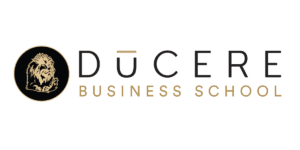Ducere Global Business School - Executive MBA
Ducere Executive MBA Program Structure
The Ducere Executive MBA is delivered with the University of East London. The mission is to bridge the gap between education and industry by designing an MBA with real career impact. Ducere collaborates with business partners around the world to stay up-to-date on global business challenges to ensure the program is innovative and industry-relevant. Instead of a traditional exam-based approach, assessments are project-focused, as real learning comes from practical implementation
The structure of the program includes five modules, covering a wide range of critical business topics and a Major Applied Industry Project, to provide students with the opportunity to transform theoretical concepts into real-time business projects.
The five MBA course modules are:
Business Strategy
Leadership in Practice
Digital Transformation
Marketing and Communications
Finance for Managers
+ Major Applied Industry Project
Curriculum
Module 1: Business Strategy
Evaluate various strategic frameworks and concepts across various organizational contexts, to foster successful business outcomes.
Strategic concepts and their role in business performance.
Strategic frameworks and their use in business decision-making.
Strategies to achieve business goals and create competitive advantage.
Strategies and their likelihood of achieving business goals.
Risk response and evaluation on strategic projects.
Variations of strategic change and relevant approaches to managing change.
Module 2: Leadership in Practice
Explore the definitions of leadership and prepare to develop the necessary capabilities to prosper in this environment.
The importance of leadership and its associated challenges.
Key leadership themes and concepts and how they can be utilized.
Concepts of self-leadership and self-awareness.
The role of emotional intelligence in effective leadership.
Module 3: Digital Transformation
This module enables students to explore the rapid technological and digital advancements within business and the impacts on the structure, people, and processes. The emphasis is on developing analytical and process skills to be able to make critical decisions about technological and digital change in organizations.
Digital disruption in business: rethinking strategy, customers, competition, data, innovation, and value.
Digital transformation as an adaptive process.
The essentials of digital transformation.
Understanding barriers and exploring methodologies.
Designing, implementing and managing processes.
Communication, engagement and iteration.
Module 4: Marketing and Communications
This subject enables students to critically examine marketing management from a customer-driven perspective. This includes evaluating and designing frameworks for fundamental concepts such as segmenting, targeting, and positioning. Customers, due to increased connectivity, have access to information and options from around the globe in a matter of seconds.
Key Marketing concepts, such as market research, buying behavior, product management and marketing communications.
Marketing strategies, including pricing and channels, segmentation and planning.
Brand management, including brand equity, brand research and brand marketing.
Module 5: Finance for Managers
This subject introduces core concepts and practices relating to finance, managerial accounting and managerial Economics. Students develop the ability to interpret and critically evaluate organizational financial information and extract data from financial statements and reports for reporting and decision-making purposes.
Interpret financial statements and extract critical information to make business decisions.
Develop an understanding of information that is used in managerial reports for internal reporting.
Develop advanced knowledge about financial management imperative to managing firms’ investments and resources.
Analyze the financial decisions from a corporate treasurer’s point of view.
Understand and identify factors impacting managerial decision-making.
Explain managerial decision-making under different market conditions.
Evaluate the impact of external and internal factors on managerial decision-making.
Major Applied Industry Project
This module enables students to consolidate skills, knowledge and insights by working with a group of student peers on a consultancy-style global challenge, provided by a Ducere Global Industry Partner.
The aim of this module is to develop the practical and professional abilities to review business and management research with academic rigor, in order to develop a concept, solution, or idea that has immediate practical application.
Learning Outcomes
Frame a successful research proposal.
Develop and understand research methodologies and apply them to a sophisticated business case study scenario.
Propose, plan, manage and execute in-depth and business management case study research.
Use your project management skills to budget, manage your time and other resources, handle data and interpret results.
Craft your case study influenced by the knowledge you gain from the coursework modules.
Write a report of your research results for an academic and professional audience.
Tuition, Scholarships, and Financial Aid
The current total cost of the Executive MBA program at Ducere Global Business School is $18,600. Payment Plans are available with the cost divided into three installments to be paid over the first part of the MBA.
Loans are also available for the program. UK residents may be eligible for a Postgraduate Student Loan to cover all or part of the fees. US students can apply for Sallie Mae loans to cover all or part of the fees
Admissions for Ducere Executive MBA
To be eligible for the Ducere Executive MBA you must have either:
Bachelor Degree from an accredited university with 8+ years of professional management experience
OR
10+ years of professional management experience
No GMAT or GRE is required for entry into the program.
It is free to apply to the program.
Application deadlines are within:
February
June
September

